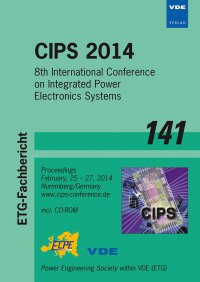Reliability assessment of molded Smart Power Modules
Konferenz: CIPS 2014 - 8th International Conference on Integrated Power Electronics Systems
25.02.2014 - 27.02.2014 in Nuremberg, Germany
Tagungsband: CIPS 2014
Seiten: 8Sprache: EnglischTyp: PDF
Persönliche VDE-Mitglieder erhalten auf diesen Artikel 10% Rabatt
Autoren:
Thomas, Tina; Lang, Klaus-Dieter (Technical University Berlin, Microperipheric Center, Fraunhofer Institute for Reliability and Microintegration - IZM, Gustav-Meyer-Allee 25, 13355 Berlin, Germany)
Becker, Karl-Friedrich; Dijk, Marius van; Wittler, Olaf; Braun, Tanja; Bauer, Joerg (Fraunhofer Institute for Reliability and Microintegration - IZM, Gustav-Meyer-Allee 25, 13355 Berlin, Germany)
Inhalt:
With the introduction of GaN/SiC power electronic devices are capable to operate at temperatures higher than 200 °C. But only the integration of control logic and maybe even sensor systems into the same package turns the power device into a smart power module. Today packaging technology still limits the high temperature operation; housing of power electronic devices is mainly realized by silicone potting over DCB. But heterogeneous modules call for another encapsulation method. State of the art molded packages typically provide high robustness up to 175 °C; but that temperature limit needs to be increased for encapsulation of power electronics. Upcoming high temperature capable molding compounds [MC] establish the base of this work - as polymers are the materials most influenced by elevated temperatures, the assessment of ageing performance is focusing on polymers, especially on MCs. Within this paper the reliability potential of a molded smart power module is evaluated. Therefore a package was developed, consisting of leadframe and several components, all encapsulated in a transfer molding process. IGBTs are represented by IGBTs and logic is exemplarily replaced by SMDs interconnected in daisy chains, assembled on HT-capable organic substrate or ceramics, respectively. Based on previous work two MCs were pre-selected as the materials with the highest potential for high temperature use. These results of thermo-mechanical analysis of initial and aged material samples delivered the input for FEM analysis of stress and strain during manufacturing and use. One material evaluation method - the pull-out test - was simulated to evaluate stresses in the molded smart power module and to assess MC reliability potential. Ageing behavior of the smart power module will be analyzed after applying temperature load. Therefore the packages are analyzed in initial state and after ageing, taking into account initial package quality and changes as delamination growth and loss of electrical integrity. In summary this paper describes the assessment of state-of-the-art MCs for encapsulation of power electronics, all resulting in a recommended procedure for identifying and qualifying high temperature stable encapsulants.


